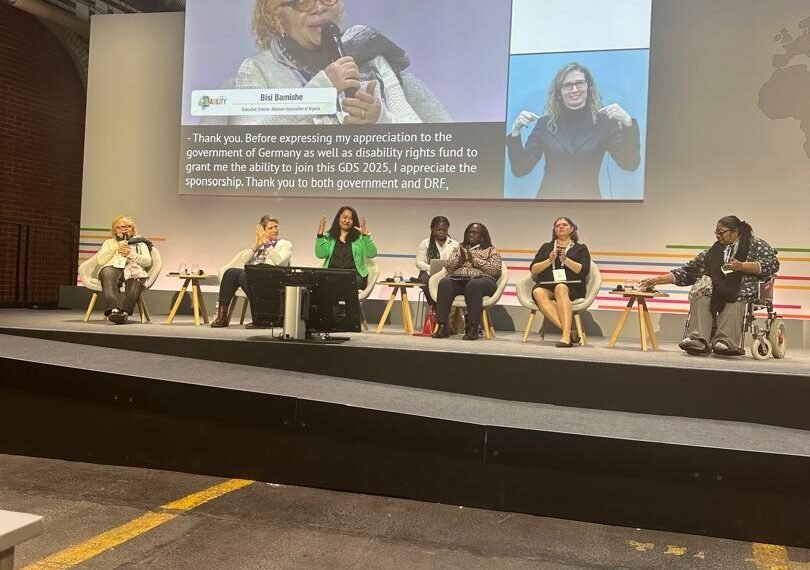Dr. Mrs. Bisi Bamishe, the Executive Director of the Albinism Association of Nigeria, participated in a panel session at the Global Disability Summit 2025 in Berlin, Germany. During the session, she responded to key questions on gender-based violence (GBV) against women and girls with disabilities and issued a call to action for world leaders.
First Question: How do we address gender-based violence against women and girls with disabilities in a scenario where even the limited space for them within human rights and development space continues to shrink?
Response: Before l proceed, l would like to take this opportunity to express my sincere gratitude to the Government of Germany, and the Disability Trust Fund (DRF) for their steadfast commitment and continuous support. In particular, I am deeply appreciative of the sponsorship provided to me and others, allowing us to be part of this year’s Global Disability Summit (GDS) and actively participate in the process.
Dr. Bamishe emphasized a multi-pronged approach to tackling GBV against women and girls with disabilities, particularly in the face of shrinking human rights and development spaces. Her response highlighted the following key actions:
- Strengthening grassroots networks and alliances to amplify voices and ensure active participation in advocacy efforts.
- Integrating disability inclusion into GBV prevention and response programs, advocating for policies that prioritize protection.
- Data-driven advocacy to collect and use disaggregated data, shedding light on the extent of GBV against women and girls with disabilities.
- Strengthening legal frameworks and ensuring accessible reporting mechanisms, including sign language interpreters and safe spaces.
- Building partnerships with activists and disability rights movements to demand accountability and push for dedicated resource allocation.
- Leveraging digital advocacy and alternative funding sources to sustain initiatives in restrictive environments.
- Ensuring meaningful representation of women with disabilities in policy discussions and decision-making spaces, leading to more inclusive solutions.
Despite the shrinking civic space, she emphasized that intersectional and persistent advocacy remains crucial in keeping the fight against GBV on the global agenda.
Second Question: What would be your call to action for world leaders gathering at the Global Disability Summit?
Response: Dr. Bamishe called on world leaders to move beyond mere commitments and take concrete action to ensure gender justice and disability inclusion. Her call to action included:
- Adopting and enforcing disability-inclusive gender policies – Governments must ensure that national gender and disability frameworks address the unique needs of women and girls with disabilities, focusing on GBV prevention, healthcare access, and economic empowerment.
- Guaranteeing financial commitments – Donors and policymakers must allocate dedicated funding to support leadership training, inclusive education, and employment initiatives for women and girls with disabilities.
- Ensuring meaningful representation – Women with disabilities should be actively included in decision-making processes at all levels—local, national, and global—to shape policies that impact their lives.
- Strengthening accountability mechanisms – Governments must establish clear monitoring and evaluation frameworks to track and report progress on disability-inclusive gender commitments.
- Prioritizing inclusive services – There must be guaranteed access to essential services, including sexual and reproductive health, legal aid, and crisis support, ensuring these are fully accessible and responsive to the needs of women and girls with disabilities.
Dr. Bamishe concluded her response with a strong call: “World leaders must act now—not in future summits—to uphold the rights, dignity, and full participation of women and girls with disabilities in society. No more excuses—only action!”
This session underscored the urgency of addressing the intersection of gender, disability, and rights, advocating for bold steps toward inclusion and justice at all levels of policymaking and implementation.



